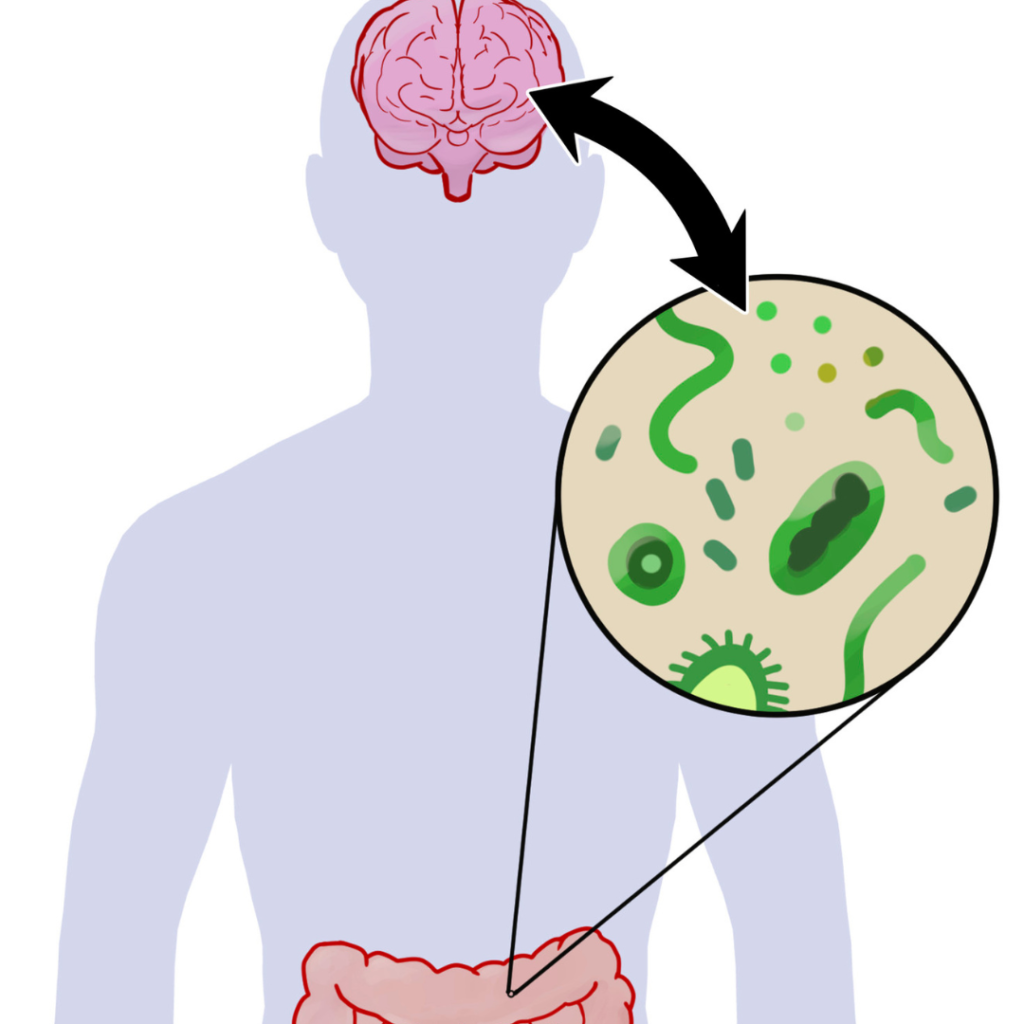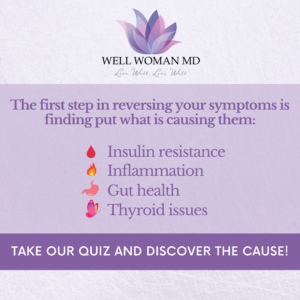Polycystic Ovarian Syndrome or “PCOS” is an endocrine disorder estimated to affect 7–10% or about 5-6 million women of childbearing age in the US. It is one of the most common causes of infertility because it interferes with a woman’s ability to ovulate or release an egg for fertilization.
With PCOS, poor gut health or a leaky gut often contribute to worsening symptoms. One way you can heal hormone imbalance symptoms, like those resulting from PCOS, is by addressing gut health.
What do I mean by gut health?
The gut is a powerful organ. It can transform what we eat into the valuable nutrients we need to fuel our bodies.
Damage occurs when we get exposed to antigens, such as environmental toxins or foods that disrupt the microbiome. It also causes the lining to be disrupted and no longer provides a sufficient barrier to prevent infections.
Everyone’s gut is a unique combination of bacteria, viruses, protozoa, fungi, and more. Roughly 10 percent of our microbiome is our unique blueprint. Our microbiome needs a high level of diversity, so we want an abundance of the “good guys” and less of the “bad guys.” For it to be healthy, the lining must be intact and contain a diverse population of microorganisms.
The microbiome has several jobs, including:
- Hormone production
- Nutrient Absorption and Vitamin Production
- Immune System Regulation
- Making neurotransmitters for our brain
According to several studies, PCOS women have less diversity in their gut and vaginal microbiome. This worsens PCOS symptoms. The higher the androgens, the more “bad bugs” there are, which can also lead to insulin resistance, IBS, SIBO, and candida overgrowth.

How does your gut influence your PCOS?
Balanced hormones depend on a healthy gut.
If you’re here, you likely already know that medications like Metformin or hormonal birth control can be helpful for some people to treat PCOS, but they don’t address the root causes of PCOS. The good news is that the foods you eat, your gut health, and lifestyle choices definitely can.
Rebalancing your gut health can support healthy hormone balance, stabilize insulin and blood sugar, and decrease inflammation, often at the root of PCOS symptoms.
When there is an imbalance of the gut microbiome, we call this gut dysbiosis or leaky gut. A leaky gut causes not only digestive symptoms but also significant inflammation. Chronic inflammation leads to insulin resistance and higher androgens which then cause more inflammation. It is a “snowball” effect, leading some researchers to wonder if a leaky gut is the cause of PCOS.
Does PCOS start in the gut?
Women with PCOS need to focus on gut health to reverse their symptoms even if they do not have digestive issues. Because the microbiome in our gut regulates estrogen levels, it is called the estrobolome. It is a set of specific bacteria with distinct genes that metabolize estrogen and keep it in check in our bodies. Have you heard of estrogen dominance? Yep, estrogen dominance ensues when the gut microbiome is unhealthy, wreaking havoc on our overall balance.
Let’s review the basics of the estrobolome
While it varies depending on your menstrual cycle, estrogen is made daily. After it is released by the ovaries and circulates in your bloodstream, it goes to the liver to break down into estrogen metabolites. The metabolites are then reabsorbed or eliminated in the intestines. The estrobolome bacteria produce an enzyme called beta-glucuronidase that will break down estrogen into other active forms. If the body needs more hormones, they can be reabsorbed and used. If not, it gets eliminated. If there is less beta-glucuronidase, then you let higher levels of androgens.
Tips for Healing Your Gut and Improving PCOS
The Birth Control Pill is not the answer!
The birth control pill masks PCOS symptoms but does not fix the underlying imbalance. You must focus on nutrition (proper diet and gut health), lifestyle, and mindset to correct the imbalance.
EAT FOR GUT HEALTH
The following dietary modifications can help support better gut function:
- An anti-inflammatory diet that is higher in protein and fats than carbohydrates.
- Get enough fiber at least 35 grams daily, especially from vegetable sources.
- Experiment with fermented foods like sauerkraut, kimchi, and yogurt.
- Crowd out refined, processed, and artificial sugars.
- Regularly consume prebiotics to feed your gut bacteria. Good sources include acacia, fiber, and inulin (found in bananas, chicory root, garlic, Jerusalem artichokes, leeks, and onions).
DECREASE EXPOSURE TO ENDOCRINE-DISRUPTING CHEMICALS.
Many toxins in the diet, food supply, and personal products contain xenoestrogens. These are estrogen-like chemicals that can influence estrogen production and function. Reducing exposure to these will help the body produce its natural estrogen in the correct balance.
- Avoid BPAs commonly found in plastic food containers.
- Use a glass or stainless steel water bottle.
- Choose organic fruits and vegetables, grass-fed meats, and sustainably caught wild fish.
- Consider investing in a water purification system for drinking water or even your whole house.
- Avoid phthalates and fragrances – both commonly found in the home and personal care products.
CROWD OUT SUGAR.
Too much sugar in the diet can alter blood sugar levels and increase the risk of insulin resistance. The body becomes stressed by too much sugar consumption, which shifts the balance of hormones. Glucose spikes can interfere with ovulation. Sugar also taxes the liver, which helps detoxify hormones. You want to work on utilizing fruit as your primary source of sugar. You can also try swapping sugary and artificial sweeteners with natural alternatives, like stevia and monk fruit. You can do this at your own pace. Eating a fiber-rich diet can help stabilize blood sugar and decrease sugar cravings when crowding out sugar.
SUPPORT LIVER HEALTH.
The liver is crucial to the detoxification of estrogen. It is vulnerable to poor diet, stress, and toxins. Eating a diet that supports liver function can help it regenerate and be more resilient. Choices for a healthy liver diet include:
- Cruciferous vegetables, including bok choy, broccoli, cabbage, and cauliflower
- Bitter leafy greens, such as arugula, chard, dandelion greens, and watercress
- Beets
- Limiting alcohol consumption.
Healing Your Gut to Improve PCOS Symptoms
Gut health is directly linked to hormonal conditions like PCOS and others. Repairing and maintaining a healthy gut is one of the most critical factors in managing PCOS symptoms.
Eating a quality diet, including plenty of anti-inflammatory and antioxidant foods, and taking care of your microbiome promotes a healthy gut and may help manage PCOS progression.
If you’re working on managing your PCOS symptoms, it’s important to consult a qualified holistic practitioner to help you navigate your hormone journey.








